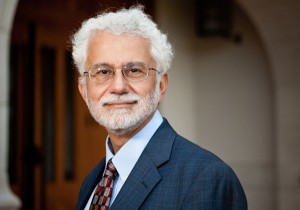Peter Joy, the Henry Hitchcock Professor of Law at Washington University in St. Louis and director of the Criminal Justice Clinic, discusses the recent search of the office, home and hotel room of Michael Cohen, lawyer to President Donald Trump. Joy explains why such an investigative search is a pivotal event when it comes to issues of attorney-client privilege and client confidentiality. Joy is an expert on legal ethics and has written a book chapter in Professional Responsibility: A Contemporary Approach dealing with attorney client privilege and client confidentiality.
It is reported in the New York Times that the searches were seeking information about payments to women who allegedly had affairs with President Trump before he took office, but can the government search a lawyer’s papers and records whenever it wants? To answer this question, one has to understand attorney-client privilege, client confidentiality and work product doctrine.

In a legal ethics column I co-authored, “When Does Monitoring Defendants and Their Lawyers Cross the Line?”, I explain that attorney-client privilege, work product, and client confidentiality are distinct, though lawyers, judges and lay- people alike often conflate or confuse them. One of the reasons for this conflation and confusion is that attorney-client privilege, the work product doctrine and client confidentiality are all based on the assumption that effective legal representation requires free and open communication between client and counsel, and all three are aimed at encouraging such open communication by keeping certain information from one’s adversary. Another reason attorney-client privilege, the work product doctrine and client confidentiality are often confused is that there is frequently significant overlap in the scope of what each covers.
Attorney-client privilege
Attorney-client privilege is a rule found in the law of evidence. It may be found in a state or federal rules of evidence, a statute or the jurisdiction’s common law of evidence (what courts understand the law to be from past application of the law). The underlying rationale for attorney-client privilege is that protecting communications between a client and his or her lawyer will encourage the client to communicate freely with the lawyer, thereby enabling the lawyer to provide better representation to the client.
Regardless of where the rule may be found in a particular jurisdiction, the elements of attorney-client privilege require: 1.) a communication; 2.) made between privileged persons (typically the lawyer and client); 3.) in confidence; and 4.) for the purposes of obtaining or providing legal advice or other assistance to the client. Under this definition, attorney-client phone calls, e-mails and communications in meetings made in confidence for the purpose of obtaining or giving legal assistance are covered by attorney-client privilege. Thus, the attorney-client communications between Mr. Cohen and President Trump would be covered by attorney-client privilege unless they fit an exception to the attorney-client privilege.
The most common exception the government uses for obtaining communications covered by attorney-client privilege is the crime-fraud exception. This exception states that if lawyer and client communications further a crime or fraud, they are no longer protected by attorney-client privilege. In the current controversy over the searches involving Mr. Cohen and President Trump, one possible crime would be if Mr. Cohen or others made the payments for Mr. Trump as unreported, illegal campaign contributions.
Work product doctrine
The work product doctrine is distinct from attorney-client privilege. It is currently found in rules of civil and criminal procedure, and states that materials prepared for litigation are protected from an adversary’s discovery request. The rationale for this protection is that properly preparing for litigation means the lawyer should be able to keep preparations private and the other side should not be able to see the lawyer’s game plan for the litigation.
In United States v. Nobles, 422 U.S. 225, 238 (1975), the U.S. Supreme Court stated that the work product doctrine was even more important to the proper functioning of the criminal justice system, and “[a]t its core, the work-product doctrine shelters the mental processes of the attorney, providing a privileged area within which he can analyze and prepare his client’s case.” The court stated: “The interests of society and the accused in obtaining a fair and accurate resolution of the question of guilt or innocence demand that adequate safeguards assure the thorough preparation and presentation of each side of the case.” (Id.)
Client confidentiality
In contrast to both attorney-client privilege and the work product doctrine, which are legal rules or doctrines, client confidentiality is found in legal ethics rules that define a lawyer’s duties to clients and regulates lawyer conduct. The client confidentiality duty is found in Rule 1.6 of the American Bar Association Model Rules of Professional Conduct, which states have adopted in some form.
Model Rule 1.6 states: “A lawyer shall not reveal information relating to the representation of a client” other than with client consent or if an exception to the rule of confidentiality is met. Comment 3 to Model Rule 1.6 explains that the rule of confidentiality “applies not only to matters communicated in confidence by the client but also to all information relating to the representation, whatever its source.”
By encompassing all information relating to the representation of a client, client confidentiality covers much more than either attorney-client privilege or the work product doctrine. Communications with witnesses, potential witnesses d others, and an attorney’s notes and impressions about evidence and drafts of materials prepared on behalf of the client, regardless if prepared in anticipation of litigation or trial, are covered by client confidentiality.
